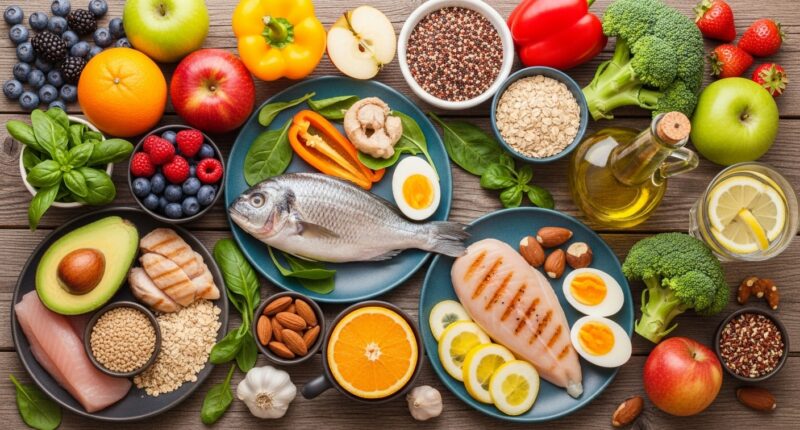Maintaining a balanced diet doesn’t have to be complicated. With the right approach, you can enjoy delicious meals while nourishing your body. This guide to choosing healthy foods for every meal will help you create smart choices at breakfast, lunch, dinner, and even snacks. By following these tips, you’ll boost your energy, improve digestion, and support long-term health.
Why Healthy Eating Matters
Eating a nutrient-rich diet provides your body with the vitamins, minerals, and energy it needs to function properly. A well-balanced meal plan can:
-
Maintain a healthy weight
-
Reduce the risk of chronic diseases such as diabetes and heart disease
-
Strengthen your immune system
-
Improve focus, mood, and productivity
Making mindful food choices daily ensures you’re fueling your body with quality ingredients.
Healthy Breakfast Choices
Focus on Whole Grains and Protein
Breakfast sets the tone for the day. Instead of sugary cereals or pastries, choose whole grains like oatmeal, whole wheat bread, or quinoa. Pair them with a protein source such as eggs, Greek yogurt, or nut butter. Protein keeps you fuller longer and prevents mid-morning cravings.
Add Fruits and Healthy Fats
Fruits like berries, bananas, or apples provide natural sweetness, antioxidants, and fiber. Healthy fats, such as avocado or chia seeds, help regulate blood sugar and provide lasting energy.
Example breakfast: Overnight oats topped with chia seeds, blueberries, and almond butter.
Smart Lunch Options
Build a Balanced Plate
A healthy lunch should combine lean proteins, complex carbohydrates, and colorful vegetables. Aim for half your plate filled with vegetables, one-quarter with lean protein (like chicken, tofu, or beans), and one-quarter with whole grains (such as brown rice or quinoa).
Choose Healthy Dressings and Cooking Methods
Skip fried foods and heavy sauces. Instead, opt for grilled, baked, or steamed dishes. Dress salads with olive oil, lemon juice, or light vinaigrettes instead of creamy dressings.
Example lunch: Grilled salmon with roasted sweet potatoes and a side of leafy greens.
Nutritious Dinner Ideas
Focus on Lighter Meals
Dinner should nourish you without being too heavy before bedtime. Choose lighter proteins like fish, lentils, or turkey. Pair them with steamed vegetables and a small portion of whole grains.
Watch Portion Sizes
It’s easy to overeat at dinner, especially after a long day. Use smaller plates, chew slowly, and listen to your body’s hunger signals.
Example dinner: Stir-fried vegetables with tofu, served with a small portion of brown rice.
Healthy Snack Choices
Snacking can support your metabolism if done right. Instead of chips or candy, choose snacks that are both tasty and nutrient-rich.
Best Snack Options:
-
Fresh fruit with nut butter
-
Veggie sticks with hummus
-
A handful of unsalted nuts or seeds
-
Low-fat yogurt with granola
These options provide energy without excessive sugar or processed ingredients.
Hydration and Beverages
Many people forget that drinks contribute to overall health. Sugary sodas and energy drinks add empty calories and harm your health. Instead, hydrate with:
-
Water (plain or infused with lemon/cucumber)
-
Herbal teas
-
Coconut water (in moderation)
Aim for at least 8 glasses of water daily to keep your body functioning well.
Tips for Healthy Eating Success
Plan Ahead
Meal prepping ensures you always have nutritious options ready. Prepare ingredients in advance and portion meals for the week.
Read Labels
Avoid foods with high sugar, sodium, or trans fats. Choose items with short ingredient lists and recognizable components.
Practice Moderation
Healthy eating doesn’t mean giving up your favorite treats. Allow occasional indulgences but balance them with nutrient-rich meals.
Final Thoughts on Choosing Healthy Foods
Creating a healthy diet is about balance, variety, and mindful choices. By focusing on whole foods, lean proteins, colorful vegetables, and hydration, you’ll provide your body with everything it needs to thrive. Start small—swap out processed foods for fresh alternatives, add more vegetables to your meals, and stay consistent.
Making healthy food choices every day is one of the best investments you can make for your long-term well-being.









